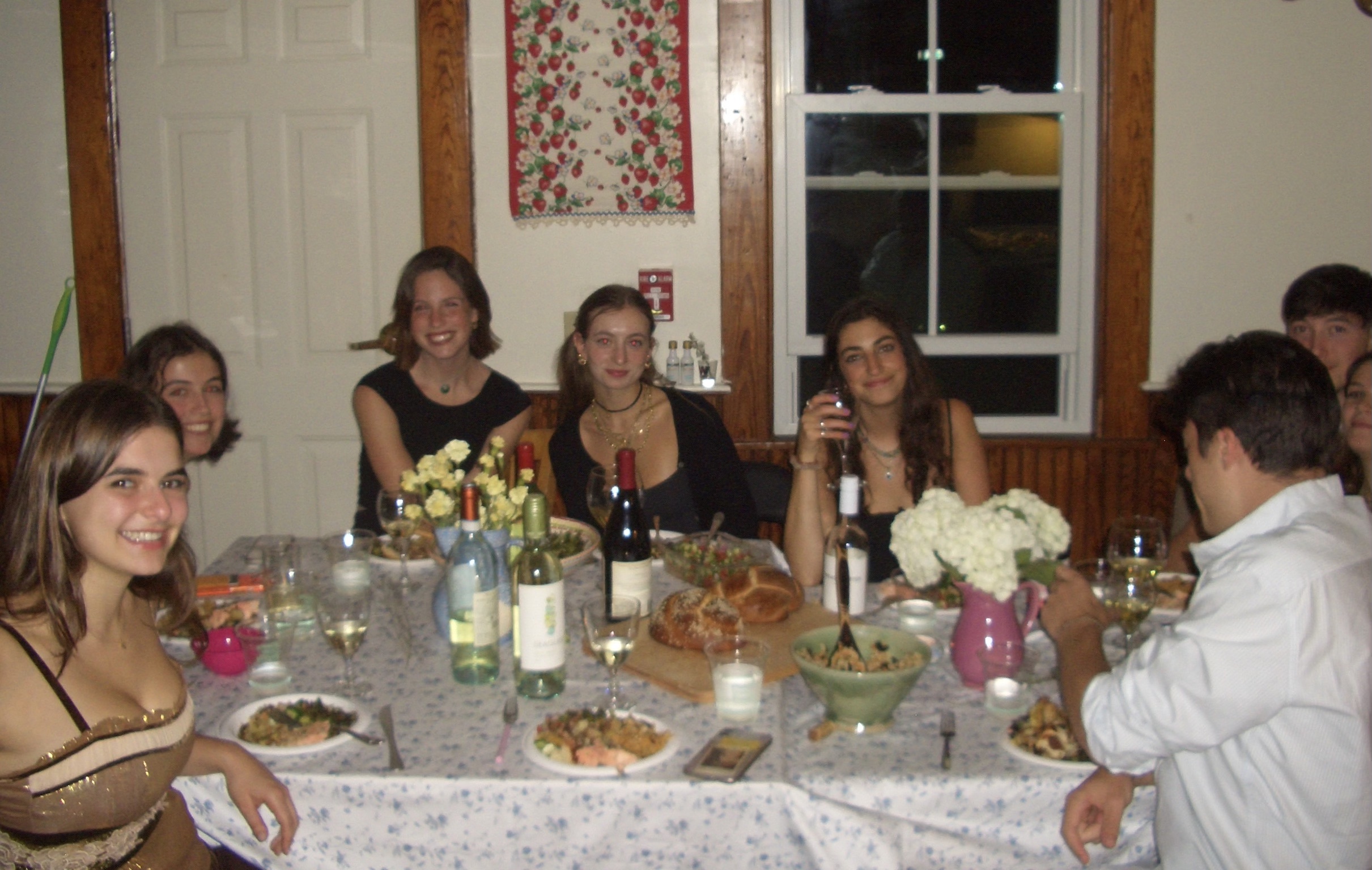
c/o Jordan Scott-Weiner
Two weeks ago, my friends and I got together for a Shabbat dinner. It all began when my friend Sabrina [Seltzer ’24] suggested the idea, and before we knew it we were making the guest list and talking about what food we’d all bring. While the food was the main event, we were also going to try to be “good Jews” and make our parents proud by reciting prayers over the candles, wine, and challah. Most of us are not observant and identify more as culturally Jewish, but a few of us have Shabbat dinner with our families every week. There were also some of us who had never been to a temple or had B’nai Mitzvah. It was clear that food was a key component of all our Jewish identities and was something we were eager to celebrate together.
We planned the menu in our group chat, all of us wanting to contribute. Out of the eight of us, five cooked and two brought wine. Most of us don’t eat meat, and we struggled to figure out what to do protein-wise. Could we pull off a fully veggie-forward meal? Should we make a meat dish that only some could eat and leave the others to fend for themselves? Having a main dish that we could all eat felt like a unifying and core part of the group dinner. Salmon was what we landed on, but there was back and forth about who was going to take it on. I offered to do it, but with a warning: I had never cooked fish for this many people before. I did have an idea of what I wanted to do though: something lemony and garlicky and herby.
First, we had to acquire the goods. Whole Foods really is a magical place: You can walk out with sheep’s milk yogurt and starfruit, or just frozen waffles and tortilla chips, and still manage to spend a fortune either way. Nothing but the best for my friends. I was on the hunt for salmon, but I had no idea how much to buy. Luckily, the friendly fishmonger told me that five pounds would work, and that is what I reluctantly purchased. And just so you know, that is a lot of fish. Like one and a half baking sheets worth. I figured it was better to have leftovers than to not have enough to feed everyone. Once we got home from the store, the kitchen in our house transformed into a flurry of chopping, juicing, mixing, and sautéing, all to the cozy tunes of Sinatra.
What was served? After we mumbled through the prayers and laughed about how none of us really knew the words or the same melodies, we dug in. First, we had two challahs made with different recipes: one that used sugar and one that used honey and featured sesame seeds. Then there was couscous two ways, one with deliciously savory roasted mushrooms and one with tart, earthy sun-dried tomatoes. Accompanying this was broccoli salted to perfection with loads of garlic and a vibrant Israeli salad for freshness. Smashed potatoes with parmesan and garlic paired well with the salmon, that somehow was not an epic fail. I could barely fit the massive filets in my oven and was concerned that it would either be overcooked or completely raw due to the varying thickness. However, this variety also allowed people to choose their desired doneness. The oregano, basil, and thyme with the lemon and garlic harmonized with flavors in the dishes made by my counterparts.
Finally came the dessert course, highlighted by a crowd favorite: pumpkin cake with a cream cheese frosting to match the autumnal feel to the day, as it was one of the first chilly days of the semester and one that made us all pay attention to the changing color of the leaves. We also had a tahini shortbread with a salted honey ganache that was perfectly nutty and chewy. We spent hours reveling in the candlelight, drinking a few too many bottles of wine, and filling our bellies.
When everyone was on their way out the door, it seemed like there was a mutual understanding that this was something we wanted to do again. Making food for your friends and sitting down to enjoy it with each other was something we felt grateful for. In the future, we hope to invite our non-Jewish peers so that they can see what it’s all about.
Jordan Scott-Weiner can be reached at jscottweiner@wesleyan.edu.